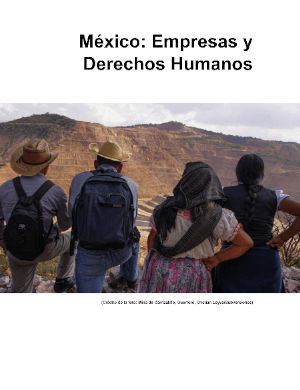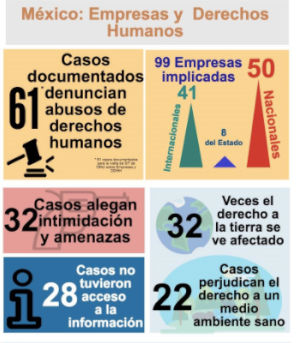Mining, infrastructure and energy projects –including hydroelectric and wind farm projects-, are those that caused the major number of human rights violations.
On the occasion of the official visit to Mexico of the Working Group on Business and Human Rights of the United Nations (UN), which will be held on August 29, a group of more than 100 organizations, movements and networks of the civil society prepared a report that states the major human rights violations perpetrated by enterprises. Moreover, this report documents more than 60 cases of human rights violations throughout the national territory.
The report highlights the human rights crisis that is being lived in Mexico, which has been recognized by different UN agencies1 and by the Inter-American Commission on Human Rights2, and the danger to those who protect human rights, land and the territory3. In the documented cases of human rights abuses committed by enterprises activities, there were involved 99 companies: 41 national, 50 foreign and 8 public. In more than half the cases there was some sort of intimidation and / or attacks against human rights defenders, and the most frequent violations were to: the right to land and territory; the right of access to information; a healthy environment; adverse health impacts, and the lack of compliance of indigenous rights.
Due to the severity of the cases documented in the report, during the regional visits of the UN Working Group, civil society and the affected communities will show them directly the impacts on human rights caused by companies linked to the mining, wind power, hydroelectric dams, agribusiness, infrastructure (roads and airports), exploitation of oil and gas pipelines, real estate, tourism and maquilas, among others. Particularly, at the suggestion of civil society and regarding its negative impacts, the Group will meet with companies such as: Grupo México, Grupo Higa,Grupo BAL, Bimbo, Goldcorp, TransCanada, Eólica del Sur and CEMEX, as well as the state production companies, Petróleos Mexicanos (Pemex) and the Federal Electricity Commission (CFE).
The systematical situations that are presented in the country that hider the progress of the UN Guiding Principles on business and human rights are:
1. State Capture: complicity, corruption and impunity. In many documented cases, the Mexican State, at all levels: federal, state and municipal, is at the service of business interests above the protection of the public interest. An example of this has been the promulgation of rules and regulations that benefit business interests over human rights; the use of public force against peaceful social mobilization; supporting extractive projects against community interests; the lack of inquiry and sanction by the judiciary and of human rights violations allegations; and the criminalization of environmental advocates.
2. Structural reforms that weaken the protection of human rights and support companies, such as the energy reform, which does not always consider its impacts on human rights or guarantees the participation and right of access to information to the affected communities.
3. Lack of prior, free, informed, culturally appropriate and in good faith consultation and consent; due diligence by the companies; and proliferation of megaprojects with several negative impacts on human rights.
4. Lack of access to justice and non-compliance of rules and judgments by the companies and the Mexican State. On multiple occasions, victims that denounce have reported attacks against them, and even if there are court decisions in their favor, including those made by the Mexican Supreme Court of Justice, its fulfillment is not observed.
5. Reduction of participation mechanisms and abuses against defenders of human rights against business activities. The cases illustrate the increase in murders, criminalization, threats and attacks on human rights defenders against projects or business activities.
In 2011, the United Nations Human Rights Council issued the “Guiding Principles on Business and Human Rights”, in order for States to exercise control over business activities and ensure they are acting with due diligence and victims have access to effective and appropriate remedial measures. In order to monitor the application of these principles, the Council established the Working Group on Business and Human Rights, to visit Mexico from August 29th to September 7th 2016, being their second visit to Latin America.
The more than 100 organizations and communities that have prepared this report and supported the organization of these meetings in Mexico, hope that the conclusions imminently reached by the Working Group at the end of their visit will be at the height of what Mexico needs; and we urge companies operating in Mexico, and the Mexican State to really consider the recommendations and their future implementation.
For more information in social media, visit: #ONUenMX
The report was made with the participation of the following organizations and human rights groups (in alphabetical order):
Alianza de la Costa Verde
Ambiente y Desarrollo Humano
Asociación Interamericana para la Defensa del Ambiente (AIDA)
Bios Iguana
Campaña Nacional Sin Maíz No Hay País
Cartocrítica
Casa del Migrante Saltillo
Business & Human Rights Resource Centre (B&HRRC)
Centro de Derechos Humanos “Fray Bartolomé de Las Casas”
Centro de Derechos Humanos “Fray Francisco de Vitoria”
Centro de Derechos Humanos “Miguel Agustín Pro Juárez” (Centro Prodh)
Centro de Derechos Humanos de la Montaña, Tlachinollan
Centro de Derechos Humanos Toaltepeyolo
Centro de Derechos Humanos Zeferino Ladrillero (CDHZL)
Centro “Fray Julián Garcés” Derechos Humanos
Centro de Reflexión y Acción Laboral (CEREAL)
Centro Diocesano para los Derechos Humanos “Fray Juan de Larios”
Centro Mexicano de Derecho Ambiental (CEMDA)
Colectivo sí a la vida No al basurero tóxico en Noria de la Sabina
Comités de Cuenca Río Sonora (CCRS)
Comité de Defensa Integral de Derechos Humanos Gobixha (CODIGODH)
Comité de Derechos Humanos de Tabasco (CODEHUTAB)
Comisión Mexicana para la Defensa y Promoción de los Derechos Humanos (CMDPDH)
Consejo en Defensa de la Vida y el Territorio TiyatTlali
DECA Equipo Pueblo
DH Rayoactivo
El Barzón Chihuahua
EcoRed Feminista la Lechuza Buza
Enfoque DH
Estancia del Migrante en Querétaro
Frente de Pueblos en Defensa de la Tierra y el Agua (FPDTA)
Fundar, Centro de Análisis e Investigación
Foro de Derechos Humanos y Resistencias de la Sierra de Puebla
Greenpeace México
Grupo de Estudios Ambientales
Grupo Focal sobre Empresas y Derechos Humanos
Indignación, Promoción y Defensa de los Derechos Humanos
Instituto Mexicano para el Desarrollo Comunitario (IMDEC)
Movimiento Ciudadano en Defensa de la Loma
Movimiento Mexicano de Afectados por las Presas y en Defensa de los Ríos (MAPDER)
Movimiento Mesoamericano contra el Modelo Extractivo Minero (M4)
OrganicConsumersAssociation (México)
Oxfam México
Programa Universitario de Derechos Humanos, Programa de Incidencia, Programa de Medio Ambiente, UIA
Proyecto de Derechos Económicos, Sociales y Culturales (ProDESC)
Proyecto sobre Organización, Desarrollo, Educación e Investigación (PODER)
Red Mexicana de Afectados por la Minería (REMA)
Semillas de Vida
SMR, Scalabrinianas: misión con Migrantes y Refugiados
Serapaz, Servicios y Asesoría para la Paz
Y la Red Nacional de Organismos Civiles de Derechos Humanos “Todos los Derechos para Todas y Todos” (conformada por 80 organizaciones en 21 estados de la República mexicana).
The information was collected based on the baseline questionnaire for documenting abuses of companies prepared by the Business and Human Rights Resource Centre (B&HRRC) and the ESCR NET https://goo.gl/YLhbSM


